Loading docks require many safety features as they can be dangerous work environments to protect both, the property and the workers. Many forklift accidents occur every year that are caused by a truck prematurely departing from the dock or creeping away during the loading or unloading. Installing a Vehicle Restraint can help prevent these accidents by securing a trailer to the dock and providing better communication between the truck driver and dock attendant.
Benefits of Installing Vehicle Restraints in Your Loading Dock
According to Jeremy Artz, Vehicle Restraint Product Manager at McGuire, the average direct cost of a medically consulted worker injury accident in the US is $41,000, while the average direct cost of a worker death is $1,190,000.
The most important benefit of using vehicle restraints is that it increases safety on your loading dock. Vehicle restraints eliminate the gap between the vehicle and the dock due to vehicle creep, which workers, forklifts, and hand trucks could potentially fall into.
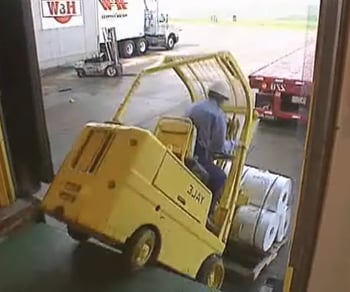 Forklift Accident due to Truck's Early Departure
Forklift Accident due to Truck's Early Departure
Besides helping minimize the accidents in the loading dock, the use of vehicle restraints also plays a significant role in improving efficiency and productivity while reducing the chances of a vehicle being stolen.
Main Types of Vehicle/Truck Restraints
These are some of the vehicle restraints that are available in the US market.
1. RIG Bar Vehicle Restraint
RIG bar vehicle restraints (truck restraints) block the RIG (rear impact guard) bar of the truck or form a vertical obstruction, preventing the vehicle from moving away from the dock until the restraint is released by the dock operator. These restraints are typically mounted to either the dock wall or to the drive immediately in front of the dock, but can also be recessed in the building structure under the dock pit as well.
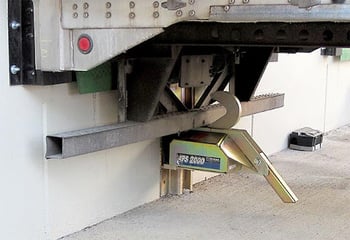 RIG Bar Vehicle Restraint in Loading Dock
RIG Bar Vehicle Restraint in Loading Dock
- Automatic Vehicle Restraints: This vehicle restraint is operated with push-button activation. It comes equipped with a RIG sensor bar that notifies dock workers if the restraint's arm is not securely engaged with the trailer's Rear Impact Guard.
- Mechanical Vehicle Restraints: These truck restraints are manually operated by dock attendants. For efficiency and ease of operation, they don’t require any power. Mechanical vehicle restraints are the most economical type.
2. Light Communication Systems
To signal to workers whether the restraint is engaged or not, you can also install a stop-and-go light communication system. Colored lights communicate the status of the loading operation to the dock operator and to the driver of the transport vehicle. Typically one set of lights is visible to the dock operator to indicate whether the restraint is engaged, and another set of lights is visible to the transport vehicle driver to indicate whether it is safe to pull the vehicle away from the dock. The lights are typically green to indicate “GO” and red to indicate “STOP”.
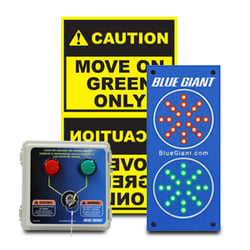 Light Communication System for Loading Docks
Light Communication System for Loading Docks
3. Wheel Chocks
The most basic (and less safe) type of vehicle restraint is a wheel chock which can be utilized with or without a light communication package (mentioned below). A wheel chock can be a simple block of wood, form-fitted rubber/laminate wedge chock, or constructed of plastic or metal alloy. A wheel chock is manually placed in front of one or more of the trailer's wheels in an attempt to restrict the trailer's movement during the loading/unloading process.
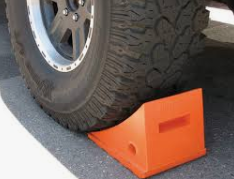 Wheel Chock
Wheel Chock
4. UniChock Vehicle Restraint
The UniChock is a wheel-based trailer restraint with advanced light communication and is available as a standalone unit or integrated with other dock equipment.
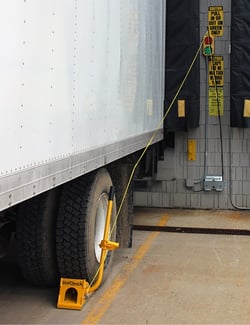 UniChock - Keeping Loading Dock Safe
UniChock - Keeping Loading Dock Safe
The UniChock is equipped with advanced safety features. In addition to the controller message display and light communication, If the chock is moved to an unsafe position during loading, an audible alarm will sound until the restraint is back in the correct position.
After loading is complete, the dock attendant stores the leveler and closes the overhead door, which will then sound and display indications to return the UniChock to the storage bracket.
If you would like to learn more about loading dock equipment, contact us today. You can call us at 973-471-4060 or email us at info@loadingdock.com. It will be a pleasure to assist you.
24-hour emergency service is available for our existing customers.









